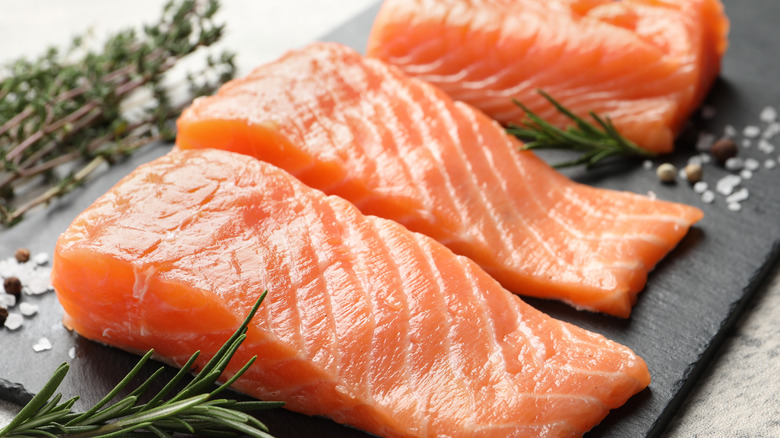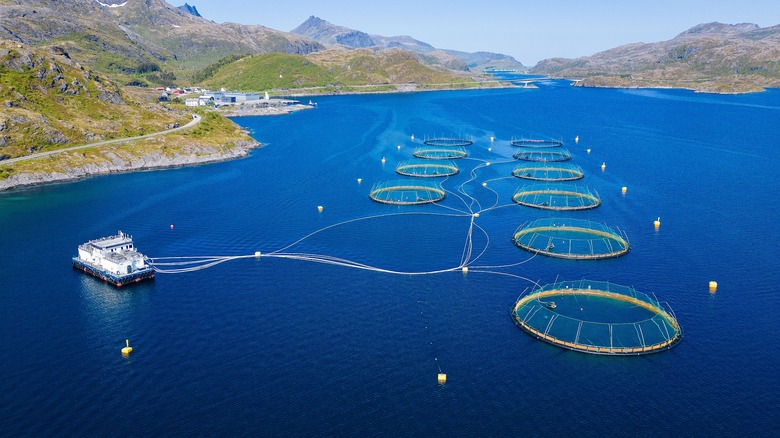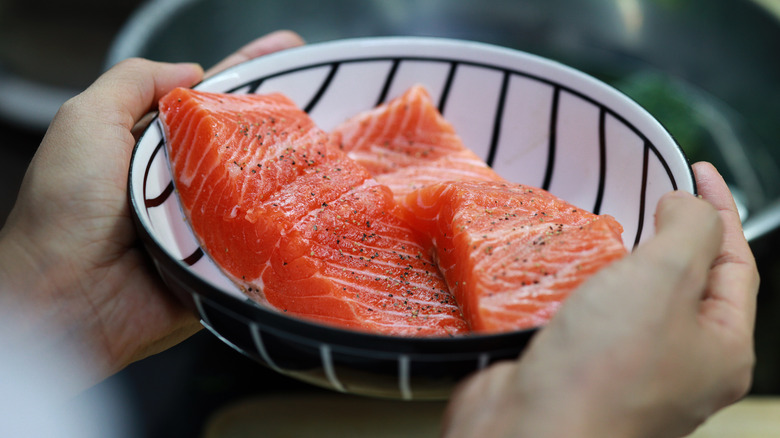Why Farm-Raised Salmon Is Banned In Many Countries
Wild-caught salmon — you've seen it in organic markets, upscale eateries, sushi bars, and just about any spot with overtones of quality or wellness. You may not know why the qualifier is included, or if it really makes the salmon any better than the alternative in terms of taste or health. Today, roughly 70% of salmon produced for consumption comes from farms, though you'll rarely see "farm-raised" in the marketing language. And while most of the proteins on our plate are farm-raised, from turkey to pork, many still prefer their fish to be strictly nature-made.
With wild-caught salmon costing up to four times the average price of farm-raised salmon, it is worth questioning the real difference between farmed salmon and wild salmon. As it turns out, a salmon's origin may mean the difference between permission and prohibition. No, it is not because of the difference in color, which you shouldn't judge a salmon's quality by anyway. The truth is, some countries have banned the farm-raising method due to the potential health hazards to consumers and environmental impacts.
Why certain countries are wary of farm-raised salmon
As of 2024, salmon farms are banned in multiple countries, including Denmark, Argentina, and Australia, and Pacific American states, including Alaska, California, and Washington. Or, at least, certain practices within the salmon farming industry are banned. One of those is the use of open net-pens; and while they're the source of about 99% of farmed salmon, they are key disruptors to local aquatic ecosystems since the water flows between the pens and the open water. The close quarters in which many salmon are confined can also lead to the rapid spread of diseases and sea lice, within the farmed population and beyond it.
Farmers will combat these issues with antibiotics and pesticide treatments, which can pose adverse effects on nearby wildlife. Catherine Collins, co-author of the 2022 book "Salmon Wars: The Dark Underbelly of Your Favorite Fish" reported in the New York Times, "Every place where Atlantic salmon is raised in net-pens, the wild population has declined by as much as 70 percent."
As for health, it's hard to argue against wild caught salmon. For more than 20 years, scientists have found about seven times more PCBs, a likely carcinogen, in farmed salmon compared to its wild counterpart. Additionally, the antibiotics commonly used for farmed salmon have raised concerns about the risk of antibiotic resistance in humans. Given this, food experts commonly urge consumers to opt for wild-caught over farm-raised salmon.
Hope for the future of farmed salmon
To be clear, farmed salmon still offers plenty nutritional benefits, like heart-healthy omega-3 fatty acids and protein, and economical benefits, like the guarantee of meeting global demand. However, the cons of farming practices beg the question of whether those pros are enough. The wild-caught counterpart may present fewer environmental and human health implications, but the method cannot meet the global demand the same way farming can.
Producing salmon in a controlled environment is undoubtedly more efficient than fishing in the open water, which is why agencies like the USDA are working to develop more sustainable farming methods. Land-based farms, for instance, isolate the salmon and their environment from nearby open water and allow consumers more local access to the fresh fish. While the infrastructure of land-based farms still pales in comparison to open net-pens, land-based producers are planning to scale up in the coming decades. Farmed salmon may be banned in certain parts of the world, but rethinking the practices of the farming industry may lead policymakers to rethink these bans, too.


